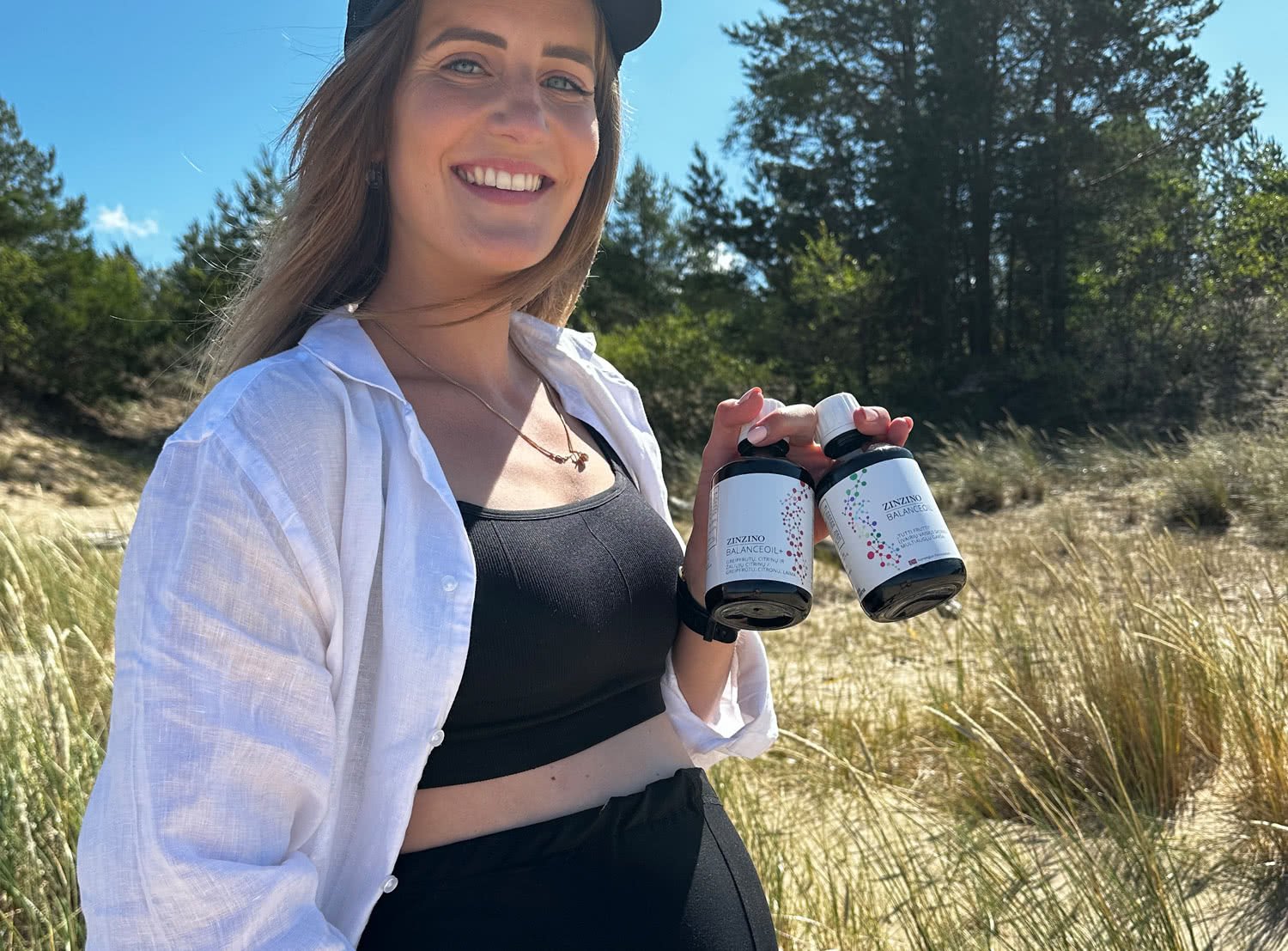Alexandra Juhasz
Zinzino Independent Partner
Welcome! I'm your independent consultant, here to guide you on your health journey. Let me know what you need!
Omega-3: Supporting every stage of motherhood
Scientifically proven fish oil supplements, specially selected for pregnancy and while breastfeeding to help you nourish your body.
Omega-3: Supporting every stage of motherhood
Scientifically proven fish oil supplements, specially selected for pregnancy and while breastfeeding to help you nourish your body.
Discover our Maternity Balance Kit
Made for all of you who are giving life and living life.
Welcome to a journey of health and well-being, for you and your baby. Let’s come together to celebrate not only the growing life within you, but also your health, your strength, and your remarkable capacity to nurture.
Taking care of yourself is not a luxury, it's a necessity. Even more so when you’re nourishing for two. You need nutritional supplements selected with your changing body in mind, helping you thrive during one of the most precious times in life. Whether it’s before during or after you give birth, it’s never too late to start giving yourself the nutrition your body needs.
We are here to support you every step of the way.
Benefits of Omega-3 during pregnancy

Brain health
Omega-3 fatty acids are critical for fetal neurodevelopment and may work as a protection against postpartum depression.

Eye health
DHA fatty acids support normal vision and contributes to normal eye development in the fetus.

Heart health
EPA and DHA contribute to the normal function of the heart, normal blood triglyceride levels, and normal blood pressure.

Pregnancy outcome
Omega-3 may be important for timing of pregnancy and birth weight.
Our maternity range of Omega-3 supplements
Trying for a baby
Marine Omega-3 fatty acids, especially DHA and EPA, are key players for your reproductive health. They contribute to hormone regulation and the development of healthy eggs, which are essential for fertility. Optimizing these nutrient levels before getting pregnancy prepares your body for carrying a baby.

Carrying a baby
When your pregnant, the body releases its own DHA stores into the bloodstream to make sure the fetus gets enough of these essential fatty acids to develop its brain and eye. Experts recommend you to keep a close eye on your Omega-3 levels during this stage to ensure both yours and your baby's needs are met.

Having a baby
After giving birth, it's crucial to continue monitoring your Omega-3 levels. Some women may experience as much as 50% drop only two weeks postpartum, and it can take up to six months for these levels to fully replenish. Getting enough Omega-3s is essential for both your nursing baby —who needs DHA for the central nervous system —and yourself, to lower the risk of postpartum depression.

Keep track of your changing body
Even though there are no specific guidelines on blood biomarkers, some experts recommend aiming for 5% DHA and an overall target of 8% EPA+DHA. Monitor these levels through blood testing to get a clearer picture of your maternal Omega-3 status and ensure optimal health.
OUR HEALTH TEST

Frequently asked questions
Fish, especially fatty varieties, is an excellent dietary choice during pregnancy. Fatty fish is rich in the Omega-3 fatty acids DHA and EPA which are essential for both mother and baby. Pregnant women are encouraged to consume a variety of fish, emphasizing those high in DHA and low in mercury. Aim for at least 2-3 servings per week during and even after pregnancy. To ensure optimal DHA and vitamin D levels during pregnancy, prioritize foods like salmon and sardines, as well as fortified options like omega-3 enriched milk and eggs.
If your diet lacks fish or vitamin D-fortified foods, consider a supplement providing 10 micrograms of vitamin D. For those who don't consume oily fish, supplements like fish oil or algae oil offering at least 200 mg of DHA per daily dose can be an effective alternative during pregnancy.
Omega-3 supplements, particularly fish oils, are an outstanding source of DHA. While we recommend supplements containing both marine-derived omega-3s, DHA, and EPA, the primary objective is securing a supplement with at least 200 mg of DHA per serving. Fortunately, when opting for supplements, there's no need for concern about mercury or other environmental contaminants.
During your pregnancy, you begin sharing your body reserves of EPA and DHA Omega-3 nutrients with your growing baby. In the third trimester, the fatty acid levels in your body may be altered due to these metabolic and hematological changes, which may have an effect on the test values. That is why we recommend you take the BalanceTest in the first trimester or early on in the second. Your main focus during your pregnancy should be to take the BalanceOil+ supplement to ensure you and your baby are getting the important Omega-3s. Once you’ve given birth, wait a few months before taking a new test to check and monitor your Omega levels
Nutritional supplements must cater to individual needs to have an effect on the body. General daily dosage instructions are weight-based to 0.15 ml per kg of body weight. When you’re pregnant, the rule of thumb is to add an extra 3 ml to the dosage based on your pre-pregnancy weight. You should continue adding 3 ml to your daily dose while breastfeeding. Please note: If you take BalanceOil+ Vegan during your pregnancy you don’t need to add any more on top of the 0,15 ml per kilo body weight.
Are you pregnant with more than one baby? Please consult your physician for more specific guidance on the dosage of Omega-3.
While most fish and shellfish are safe to eat when you’re pregnant, there are certain types to be cautious of due to the risk of environmental toxins such as mercury and dioxins. Farmed salmon, along with other farmed fish varieties, as well as pickled herring, cod, prawns, and mussels are generally safe to eat. It's crucial to be cautious with vacuum-packed seafood intended to be consumed cold, as they can potentially harbor Listeria bacteria. While cooking thoroughly can kill Listeria, many vacuum-packed seafood items are consumed without heating. To minimize risk, always check the packaging date and avoid consuming the product if it has been packaged for more than a week. Lastly, it's worth noting that algae oil should not be confused with other types of algae products, such as dried algae supplements. These products can contain harmfully high levels of iodine, making them unsuitable and not recommended for pregnant women.
There are several important nutrients that your body needs more of when you are pregnant. Most of them are included in a varied and balanced diet. However, certain nutrients stand out in their significance during this period in life like Folic acid, iron, and Omega-3 DHA. Omega-3 fatty acids are classified as essential. This means our bodies cannot produce them on their own; instead, we must obtain them from our diet. Among all the Omega-3 fats, DHA is particularly crucial during pregnancy, because it is vital for the development of the fetal brain and eyes. Recent studies have also provided strong evidence that higher DHA blood levels during pregnancy are associated with a healthier birth weight and a reduced risk of early preterm birth.
The timing for starting Omega-3 supplements can vary and it's always best to consult with your healthcare provider for personalized advice. Here's a breakdown of potential benefits at different times:
Before pregnancy: Starting Omega-3 supplements before conception can prepare your body for the demands of pregnancy. It helps create a nutritional buffer that can be useful during and even after pregnancy. Some studies indicate that Omega-3s might enhance fertility, especially if the current levels are low.
During pregnancy: Initiating Omega-3 supplementation during pregnancy provides various benefits. DHA, in particular, plays a pivotal role in your baby's brain and eye development. Additionally, both EPA and DHA support your well-being during this period. Incorporating these supplements enhances health outcomes for both you and your growing baby.
After pregnancy: Starting Omega-3s postpartum remains beneficial, more so if you choose to breastfeed. Maternal intake of Omega-3, especially DHA, enriches breast milk, which is vital for a nursing baby's ongoing brain and eye development. Moreover, these supplements help replenish depleted bodily reserves, aiding in your postpartum recovery.
Remember! While starting early might offer cumulative benefits, there truly isn't a "wrong" time to begin supplementing your diet. Every stage in your pregnancy presents unique opportunities to thrive for both you and your growing baby.
Both EPA and DHA are Omega-3 fatty acids with unique roles during pregnancy. DHA is particularly known for its importance in the brain and eye development of the baby. EPA, while also beneficial, has traditionally been linked more to heart health and the immune system.
However, emerging research indicates that EPA plays a more critical role in pregnancy than previously thought. For instance, EPA may assist in effectively transporting DHA across the placenta to the fetus, making both EPA and DHA important for optimal nutrient delivery.
It's worth mentioning that both EPA and DHA are naturally found in fish, a commonly recommended food source for pregnant women. When dietary recommendations advocate for increased fish intake during pregnancy, it implicitly suggests that you're getting a balanced intake of both EPA and DHA. Therefore, both fatty acids are needed to fully leverage their health benefits.
Absolutely. Omega-3s aren't the only game in town when it comes to nutritional needs during pregnancy. Other key supplements often recommended include folic acid, choline, iron, calcium, and Vitamin D. Your healthcare provider can give you tailored advice on what supplements you may need.

Share this video
Or copy link
Embed code